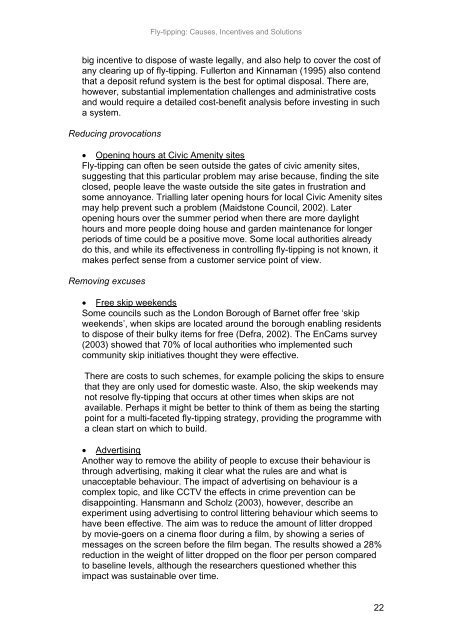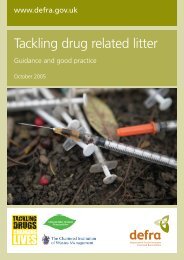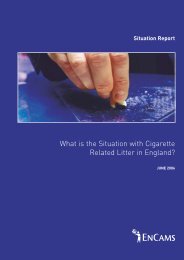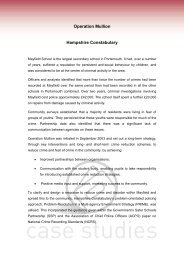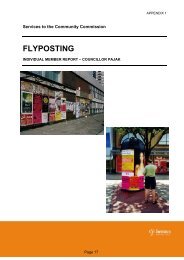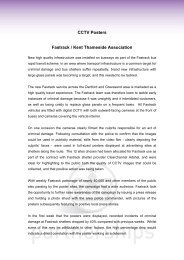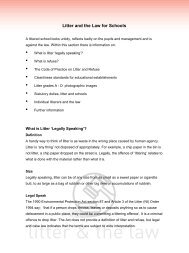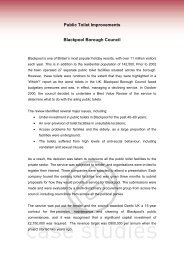Fly-tipping: Causes, Incentives and Solutions - Keep Britain Tidy
Fly-tipping: Causes, Incentives and Solutions - Keep Britain Tidy
Fly-tipping: Causes, Incentives and Solutions - Keep Britain Tidy
Create successful ePaper yourself
Turn your PDF publications into a flip-book with our unique Google optimized e-Paper software.
<strong>Fly</strong>-<strong>tipping</strong>: <strong>Causes</strong>, <strong>Incentives</strong> <strong>and</strong> <strong>Solutions</strong><br />
big incentive to dispose of waste legally, <strong>and</strong> also help to cover the cost of<br />
any clearing up of fly-<strong>tipping</strong>. Fullerton <strong>and</strong> Kinnaman (1995) also contend<br />
that a deposit refund system is the best for optimal disposal. There are,<br />
however, substantial implementation challenges <strong>and</strong> administrative costs<br />
<strong>and</strong> would require a detailed cost-benefit analysis before investing in such<br />
a system.<br />
Reducing provocations<br />
• Opening hours at Civic Amenity sites<br />
<strong>Fly</strong>-<strong>tipping</strong> can often be seen outside the gates of civic amenity sites,<br />
suggesting that this particular problem may arise because, finding the site<br />
closed, people leave the waste outside the site gates in frustration <strong>and</strong><br />
some annoyance. Trialling later opening hours for local Civic Amenity sites<br />
may help prevent such a problem (Maidstone Council, 2002). Later<br />
opening hours over the summer period when there are more daylight<br />
hours <strong>and</strong> more people doing house <strong>and</strong> garden maintenance for longer<br />
periods of time could be a positive move. Some local authorities already<br />
do this, <strong>and</strong> while its effectiveness in controlling fly-<strong>tipping</strong> is not known, it<br />
makes perfect sense from a customer service point of view.<br />
Removing excuses<br />
• Free skip weekends<br />
Some councils such as the London Borough of Barnet offer free ‘skip<br />
weekends’, when skips are located around the borough enabling residents<br />
to dispose of their bulky items for free (Defra, 2002). The EnCams survey<br />
(2003) showed that 70% of local authorities who implemented such<br />
community skip initiatives thought they were effective.<br />
There are costs to such schemes, for example policing the skips to ensure<br />
that they are only used for domestic waste. Also, the skip weekends may<br />
not resolve fly-<strong>tipping</strong> that occurs at other times when skips are not<br />
available. Perhaps it might be better to think of them as being the starting<br />
point for a multi-faceted fly-<strong>tipping</strong> strategy, providing the programme with<br />
a clean start on which to build.<br />
• Advertising<br />
Another way to remove the ability of people to excuse their behaviour is<br />
through advertising, making it clear what the rules are <strong>and</strong> what is<br />
unacceptable behaviour. The impact of advertising on behaviour is a<br />
complex topic, <strong>and</strong> like CCTV the effects in crime prevention can be<br />
disappointing. Hansmann <strong>and</strong> Scholz (2003), however, describe an<br />
experiment using advertising to control littering behaviour which seems to<br />
have been effective. The aim was to reduce the amount of litter dropped<br />
by movie-goers on a cinema floor during a film, by showing a series of<br />
messages on the screen before the film began. The results showed a 28%<br />
reduction in the weight of litter dropped on the floor per person compared<br />
to baseline levels, although the researchers questioned whether this<br />
impact was sustainable over time.<br />
22


